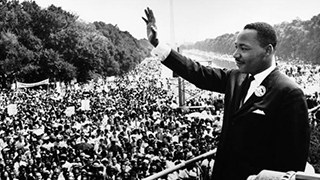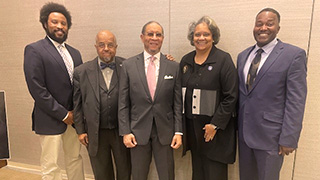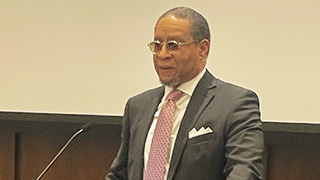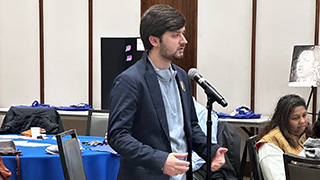Marching With Martin
Friday, January 19, 2024
 From the time he was a teenager until his death in 1968, Dr. Martin Luther King, Jr.
was driven by a profound purpose. Whether he was working alongside laborers in tobacco
fields during his college summers, or speaking to thousands assembled for what would
become the historic March on Washington, Dr. King understood that America was not
living up to its cherished democratic ideals. He knew that while God’s children were
created equal, the country did not see fit to ensure that every citizen had equal
access to basic human rights, to live with dignity and reach their full potential.
From the time he was a teenager until his death in 1968, Dr. Martin Luther King, Jr.
was driven by a profound purpose. Whether he was working alongside laborers in tobacco
fields during his college summers, or speaking to thousands assembled for what would
become the historic March on Washington, Dr. King understood that America was not
living up to its cherished democratic ideals. He knew that while God’s children were
created equal, the country did not see fit to ensure that every citizen had equal
access to basic human rights, to live with dignity and reach their full potential.
Dr. King’s life was a response to that truth. He wrote, he preached, he marched, he prayed. He dedicated himself to shining a light on the darkness, so that people could see what was happening in America and what needed to change. His mission and commitment to nonviolent protest inspired many to join him.
For others, Dr. King threatened the status quo.
The night before Dr. King was set to launch the Poor People’s Campaign, a multiracial effort aimed at gaining economic justice for the poor, he was shot down on the balcony of a Memphis motel. In that moment, the country lost one of its most courageous leaders. But Dr. King’s mighty voice lives on. He passed the baton to us and left countless examples of how we can bring the movement for justice forward.
Dr. King’s life and legacy is now celebrated on the third Monday of the new year. The day allows us to remember the dream, and to recommit to work left unfinished.
An MLK Day Tradition

The MLK Symposium brought together students, alumni, faculty and colleagues from throughout the University
For the Seton Hall community, the opportunity to remember and engage with Dr. King’s dream happens at the University's annual MLK Day Symposium. Co-sponsored by the College of Arts and Sciences and the Division of Continuing Education and Professional Studies, the day-long program was established in 2019 by Reverend Forrest Pritchett, Ph.D., director of the Martin Luther King Jr. Leadership Program and Senior Adviser to the Provost on Diversity, Equity and Inclusion. The event brings together students, faculty, staff, alumni and friends who gather on campus and online to learn about Dr. King’s message and legacy.
Interim Dean of the College of Arts and Sciences, Jonathan Farina, Ph.D., welcomed the audience to the event, noting that "the symposium is an opportunity for a different kind of learning." Listening to Dr. King’s words, he said, would be a reminder of "the personal responsibility and urgency of social justice" that is always with us.
A call to action emerged as a central theme of the program. Assistant Provost and Dean of Continuing and Professional Education, Mary Kate Naatus, Ph.D., invited attendees to draw on inspiration from the symposium to "continue the conversation throughout the year and engage with our students, staff, faculty, alumni and community partners." Facilitators encouraged participants to consider how they would keep the conversation going and engage in work to advance justice in our world.
The symposium has its roots in the University’s MLK Scholars program. As Reverend Pritchett explained during his opening remarks, the program began at the behest of a group of students who were moved to act following Dr. King’s assassination. Today, he noted, programs inspired by Dr. King have become pride points that "demonstrate Seton Hall’s commitment to the legacy of Dr. Martin Luther King, Jr."
"Follow the Leader"
Faculty representing various academic areas of the University explored topics related to King’s diverse messages. On the program were presentations on education and racism, racism and the bible, and social justice in the nonprofit sector. Clerics representing different faith communities shared blessings and reflected on Dr. King and his legacy of peace.
In his invocation, Reverend Colin Kay, the University’s vice president of Mission and Ministry, implored participants: "Let us follow the Leader. Let us follow Dr. King."
Reverend Pritchett read a proclamation from New Jersey Governor Phil Murphy proclaiming January 15 as MLK Day in the Garden State. He also explained that the symposium had been selected by the New Jersey Martin Luther King, Jr. Commemorative Commission as a noteworthy event taking place in Dr. King's honor. Pritchett shared one more milestone during his remarks. In May, Fatimah Toure, a graduate of the MLK Scholars Program, became its first Fulbright Scholar.
A New Perspective on King

Biblical scholar Obrey Hendricks, Ph.D., of Columbia University, gave the symposium's keynote address on Dr. Kings "unsung radicality."
The day’s keynote address was given by Obrey Hendricks, Ph.D., professor of religion at Columbia University. Hendricks centered his message on the idea of MLK’s "unsung radicality" and his concern for the poor, which he said was "hidden beneath the benign view of King."
A political philosopher and Nobel Peace Prize winner, Dr. King called for a restructuring of American capitalism toward a Christian democratic socialist system. Moving beyond capitalism, Dr. King argued, would better serve the common good by providing equal access to universal health care and income. Dr. King, Obrey told the audience, echoed Christ’s foremost commandment: to love your neighbor as yourself.
Obrey reflected on how Dr. King, the son of a Baptist minister, chose to spend his college summers working in fields and factories alongside struggling people. Dr. King, he said, was mortified by the abject poverty he encountered, and by the demonization of the labor movement, and the exploitation of the poor. In Dr. King’s mind, capitalism had outlived its usefulness and had become inherently unjust. "The experience of working with the struggling poor," Obrey shared, "was what defined his ministry and the direction of his life until his dying breath." King’s message went beyond civil rights, Obrey added. "He made it clear that what he advocated was a revolutionary movement with revolutionary action that would raise certain basic questions about society and the structure of American life."

Adam Shirley, a senior majoring in political science and Africana Studies, was among the MLK Scholars who attended the symposium on January 15.
Adam Shirley, president of the MLK Scholars Program, said he was inspired by Hendrick’s address and appreciated "diving deeper into what MLK stood for." "He was particularly struck by the connection that the civil rights leader made between economic inequality and religion," he said.
Later , Professor Carm Almonor, J.D., Ph.D., who recently joined the University’s Africana Studies program, returned to the idea of moving toward a more expansive view of the dream. Dr. King, he said, was calling for political and social change and the restoration of voting rights and the benefits of citizenship for all, as required under the 14th and 15th amendments. "He was an active, young and woke American dreamer," Almonor concluded.
Nkosi Dubois Anderson, Ph.D., a religious studies professor who is also a new member of the Africana Studies faculty, followed by citing a recent study by the Pew Research Center which found that 60 years after Dr. King’s historic March on Washington, 60% of Americans have a positive view of the civil rights leader’s legacy. "I believe that the percentage should be no less than 100%, but it isn’t. Why isn’t that the case? For one thing, a high percentage of people felt they did not know enough about Dr. King, which underscores the importance and the necessity of more education about Dr. King and his legacy."
The symposium was set up to do just that: inspire a greater appreciation for what mattered most to King; to go beyond his most well-known speeches.
A National Legacy of Racism
Speaking on history and racism, Larry Greene, Ph.D., a professor of history at Seton Hall for over 50 years, lamented that voter suppression, economic stagnation and exclusion seem "deeply entrenched and alive and well" in America today. Greene said that it was important to see the whole picture of racism in the context of the nation’s history. For example, in spite of new civil rights legislation in the ‘50s and ‘60s, segregation lived on in the North, evidenced by discriminatory hiring, education and housing practices that paralleled racist policies that defined the South. "Racism was national, not sectional," he explained. Green went onto say that while the need for anti-discrimination policies remains, legislation is only as good as enforcement allows and often at the mercy of political headwinds.
During an online presentation, Professor Anthony Nicotera, J.D., D.S.W., L.S.W., addressed the paradigms of peace and wellness. He spoke about Dr. King’s first meeting with Tich Nat Hanh, the influential Buddhist monk and activist at the Fellowship of Reconciliation in 1966. Nicotera reflected on the last days of King’s work in which he helped launch the Poor People’s Campaign. Responding to the needs of the poor remains a way to celebrate Dr. King’s legacy. "We must continue to rededicate ourselves to building a beloved community by planting seeds of justice and doing something for others," Nicotera maintained.
Educator, activist and entrepreneur, Jamila T. Davis, Ph.D., who is the community practitioner in residence at Seton Hall’s Center for Community Research and Engagement, spoke passionately about the power of engagement and the importance of giving back. She shared her story of earning several degrees while she was incarcerated and becoming an advocate for women in prison to help them "recognize their potential and achieve their dreams." Davis told participants to get active and decide to make a difference. "When you leave this planet," she asked the audience, "what things will keep you alive long beyond your expiration date?"
Categories: Education, Nation and World
